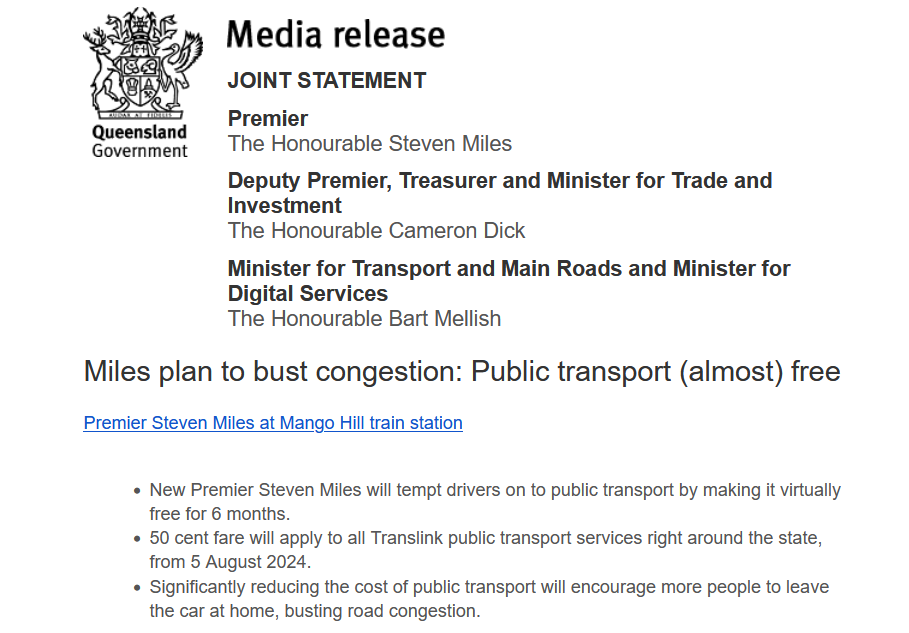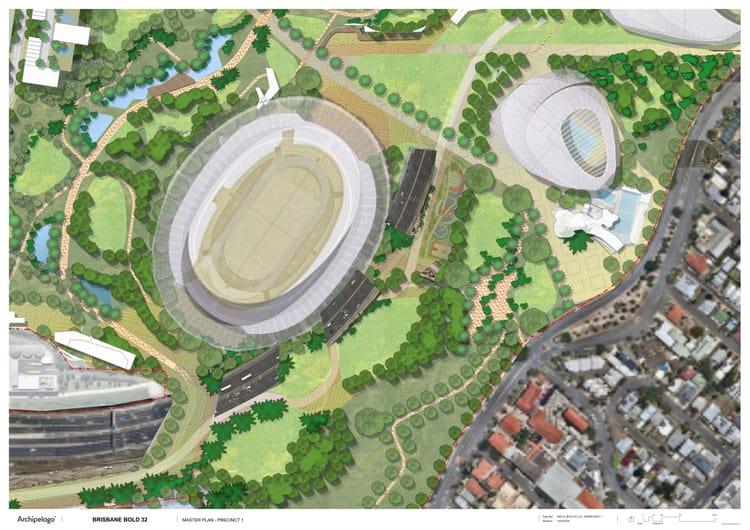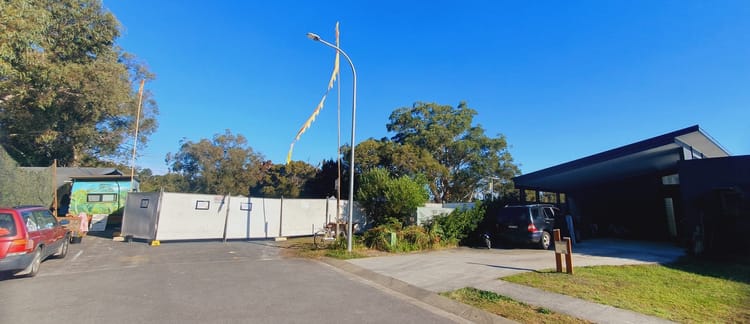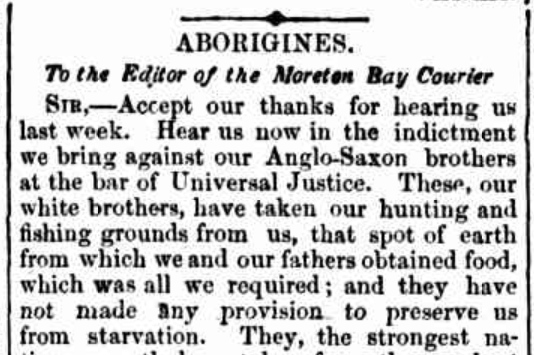QLD public transport fares dropping to 50 cents: Make it free you cowards!
The Queensland Labor government has just announced something big. The Premier might not even understand exactly how big the ramifications will be in terms of shifting commuter behaviour (perhaps none of us do yet), but this seems like a genuinely good thing...
From 5 August, 2024, for a 6-month trial, all public transport services right across Queensland will cost just 50 cents.
That's right. I thought I'd misread the media release too. 50 cents per trip, even if you're catching a train all the way from Gympie to Roma Street.
I don't think we've seen prices that cheap since the 1990s.
Disappointingly, it won't apply to privatised services like the Airtrain (boo!).
The timing of the 6-month trial is conveniently right before the October state election. It seems it'll wrap up at the start of February 2025 unless we can apply pressure to extend it (the government media release is available at this link).
For a lot of people struggling to afford transport costs, this is going to be transformative. It'll certainly get me riding the bus and train more often. Right now I'm actually kinda annoyed it's not kicking in until August.
Although I'm by no means a mindless cheerleader for the Greens, we have to acknowledge that this would not have happened if the Queensland Greens hadn't been applying significant political pressure, particularly in Labor-held seats where public transport usage is already higher than the state average. The Greens have been calling for the State Government to fund free public transport for several years now, often copping significant criticism from the major parties and conservative commentators that their idea was too 'idealistic' and unfeasible, but now the state has at least acknowledged that massive fare reductions are possible.
This of course begs the question: If as a government you're going to cop a huge revenue hit by substantially reducing fares, why not just go all the way and make them free?
Revenue vs enforcement costs
Published figures suggest that across Queensland, annual public transport patronage is currently hovering at around 170 million trips – still tens of millions lower than pre-covid patronage levels (a journalist who is paid an actual salary should ask the Premier exactly how many trips they estimate will be taken during the fare reduction period). At a very rough calculation, that would equate to revenue of $42.5 million over a 6-month period if all those trips are charged just 50 cents (noting that some school bus services and a handful of inner-city routes are already free). If patronage were to increase during the trial period by a whopping 25 percent as a result of this big fare reduction, that would translate to $53 million in ticket revenue.
At the time of writing, the State Government hasn't released up-to-date figures on how much enforcing fares actually costs. Exactly how much does it cost the government to have Translink fare inspectors – and in many areas, QLD police – patrol buses, trains and ferries, asking to see GoCards and tickets? We don't know. But the figure would easily be millions of dollars per year.
Then there's the cost of ticket machines and smart card readers. The government has foolishly just locked itself into a contract of at least 10 years for its new Smart Card Readers (which can read debit/credit cards and smart devices), alongside which the existing GoCards will apparently be phased out and replaced with a new 'Translink Card.' The last reported figures suggested that rolling out this system was costing a massive $371 million (it's probably higher by now) – we don't know how much it actually costs per day to keep these machines turned on and the back-end processing system running.
If we're estimating the costs of enforcement, we also need to include all the flow-on costs of pursuing fare evaders through the legal system – a whole web of judges and prosecutors and court administrators all being paid big money just to punish people who jump on a bus or train without paying.
There are also minor service efficiency losses associated with customers lining up to scan their cards, confusion when readers or ticket machines aren't working etc.
My point is that when you add up all the enforcement and transaction processing costs, the government can't actually be making much – if any – profit from 50 cent fares. They might as well just turn off the machines and let everyone have a free ride for 6 months.
My guess is that the two main reasons they don't want to do this are:
- they still want to collect really detailed commuter travel data so they can precisely count how many people are using all the services as a result of the big fare discount (there are other ways to do count patronage), but getting people to swipe and being able to see exactly what services they switch between is very useful data for the government)
- they don't want to admit or signal to the public that actually public transport could become free and the world won't end – it would add to much fuel to Greens calls for universal ongoing free public transport
No, free transport doesn't cause other problems
There are some commentators – including, annoyingly, the fairly right-wing leadership of the Rail Tram and Bus Union – who oppose free fares partly on the grounds that it might increase so-called anti-social behaviour or lead to unhoused people using public transport as shelter. But there doesn't appear to be any strong evidence to back up those claims.
We already have several free services operating in inner-city Brisbane including the Spring Hill loop, the 86 loop in West End and the free CityHopper ferry services. These free services do not report higher incidences of conflict between passengers or abuse of drivers than other routes. And if you provide high-quality public spaces that are safe, secure and weather-proof, no-one is going to start living on free buses and trains.
If it is the case that making public transport free for the most marginalised members of society might have some negative flow-on effects, there are other ways to address those concerns, rather than just continuing to exclude the demographics who would benefit the most from free PT.
A longer trial would paint a more useful picture
One other important point to keep in mind is that if part of the government's goal with the 50 cent trial is to see how slashing fares impacts patronage in order to build a case for ongoing fare reductions, 6 months might not actually be long enough. The fact that the 6-month trial period will end in February 2025, just before TAFE and university students return for semester 1 classes, seems like a particularly big oversight.
When commuters plan their lives and establish travel routines, there's inevitably a lag time between the cost of a particular transport mode dropping, and people shifting their behaviour. Yes, many people who already live near a public transport line and have relatively simple commutes will shift from car to bus straight away. But people who make multi-stage trips (e.g. a parent who drops their kid off to school before driving to work in the city) are going to take several months to adjust routines.
Renters who are working out where they want to live, weighing the cost of cheaper rents in areas with poor public transport versus moving to somewhere with higher rents but better bus/train options, also won't be relocating and shifting modes until their current leases finish.
If there's no guarantee that the trial will continue beyond the 6 months, it might not be enough to affect bigger financial decisions e.g. moving to locations where you can take advantage of cheaper direct public transport to your workplace, or postponing purchase of a new private vehicle.
Nevertheless, I'm predicting that this fare reduction is going to lead to a big jump in patronage when it kicks off in early August, with flow-on benefits for traffic congestion. I hope someone is planning to organise some extra bus services on popular routes that are already running at capacity.
I'm sure lots of people will have plenty more to say on this announcement. The politics and timing of this are very interesting. Labor is obviously trying to neutralise public transport costs as a state election issue, and limit the number of votes they lose to the Greens (who will no doubt still be campaigning for free public transport).
This announcement is objectively a really good thing. But a 6 month trial isn't good enough. 50 cents isn't cheap enough.
Now is the time to celebrate the win, but also ask the bigger question: why can't it just be free all the time?
If you appreciate articles like this being freely available to the wider public, please consider signing up for a $1/week subscription (if you can afford it) to help me keep writing.






Member discussion